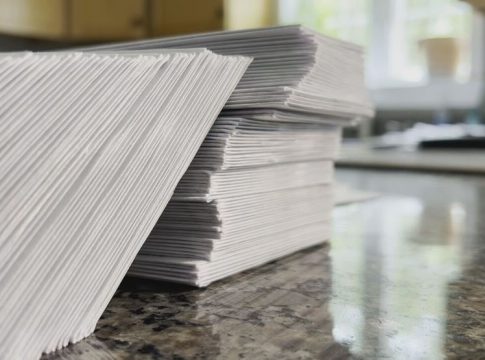A Mysterious Deluge of Mail: Understanding the Impacts on Mental Well-Being
In a recent incident that highlights the complexities of communication within bureaucracies, a licensed therapist from Maine, Brenda Caouette, received a staggering 137 identical letters from the Maine Department of Health and Human Services (DHHS) following her MaineCare credential renewal. This unexpected influx has not only raised logistical questions but also reminded us of the importance of effective communication in the mental health field.
The Overflowing Mailbox: A Closer Look
Upon renewing her credentials to continue providing services through MaineCare, the state’s Medicaid program, Caouette found her kitchen counter overwhelmed with mails. Initially dismissing the repetition as mere postal error or junk mail, she soon discovered it was a serious correspondence from the DHHS.
The letters, each conveying the same message of credential approval, sparked her concern. “This is not beneficial to anybody,” she later expressed, as her mind raced with thoughts about the cost and inefficiency associated with such a massive mailing.
The DHHS has acknowledged the situation and is currently investigating its cause, stating they have not received similar complaints, which adds another layer of intrigue to the circumstance.
The Impact on Mental Health Professionals
For those working in the mental health field, the experience shared by Caouette underscores a critical truth: administrative burdens can significantly affect the practitioners dedicated to serving their communities.
Potential Stressors:
- Administrative Overload: Receiving an avalanche of communication, especially unnecessary correspondence, can lead to heightened stress and frustration.
- Resource Allocation: The emerging concern over resource wastage—both time and money—can detract from providing care to clients.
Emotional Responses:
- Frustration: It’s common to feel overwhelmed or even powerless in the face of systemic inefficiencies. Recognizing these feelings is the first step in managing them.
- Impeded Focus: Such disruptions can detract from a therapist’s ability to concentrate on client care, affecting their overall well-being and practice quality.
Moving Forward: Advocating for Change and Efficiency
Amid her frustrations, Caouette has expressed hope that this incident will lead to enhancements in the system that could assist other providers. As professionals navigate the complexities of their roles, there’s an ongoing need for advocacy. Therapists and healthcare providers must unite to promote effective communication practices and policies.
What Can Be Done:
- Reach Out for Clarification: Encountering anomalies like duplicate mailings should prompt individuals to communicate with relevant agencies or representatives.
- Share Experiences: Documenting and sharing experiences with inefficiencies can help push for organizational changes and improvements.
Seeking Support:
If you find yourself feeling overwhelmed by similar administrative challenges, consider:
- Connecting with Peers: Shared experiences can create a support network where individuals can strategize solutions together.
- Self-Care Practices: Engage in mindfulness or self-reflection to regain your calm and focus.
Conclusion
In the face of bureaucratic challenges, it’s essential to advocate for a system that works—not only for the efficiency of administration but also for the mental and emotional wellness of providers like Brenda Caouette. As the DHHS investigates, let us all aspire towards improved communication and efficiency that uplifts every participant in the mental health ecosystem.

Covers wellness, nutrition, mental health, and daily life tips.
Bio: Talia brings a background in health journalism and holistic living to help readers live better, one tip at a time.

